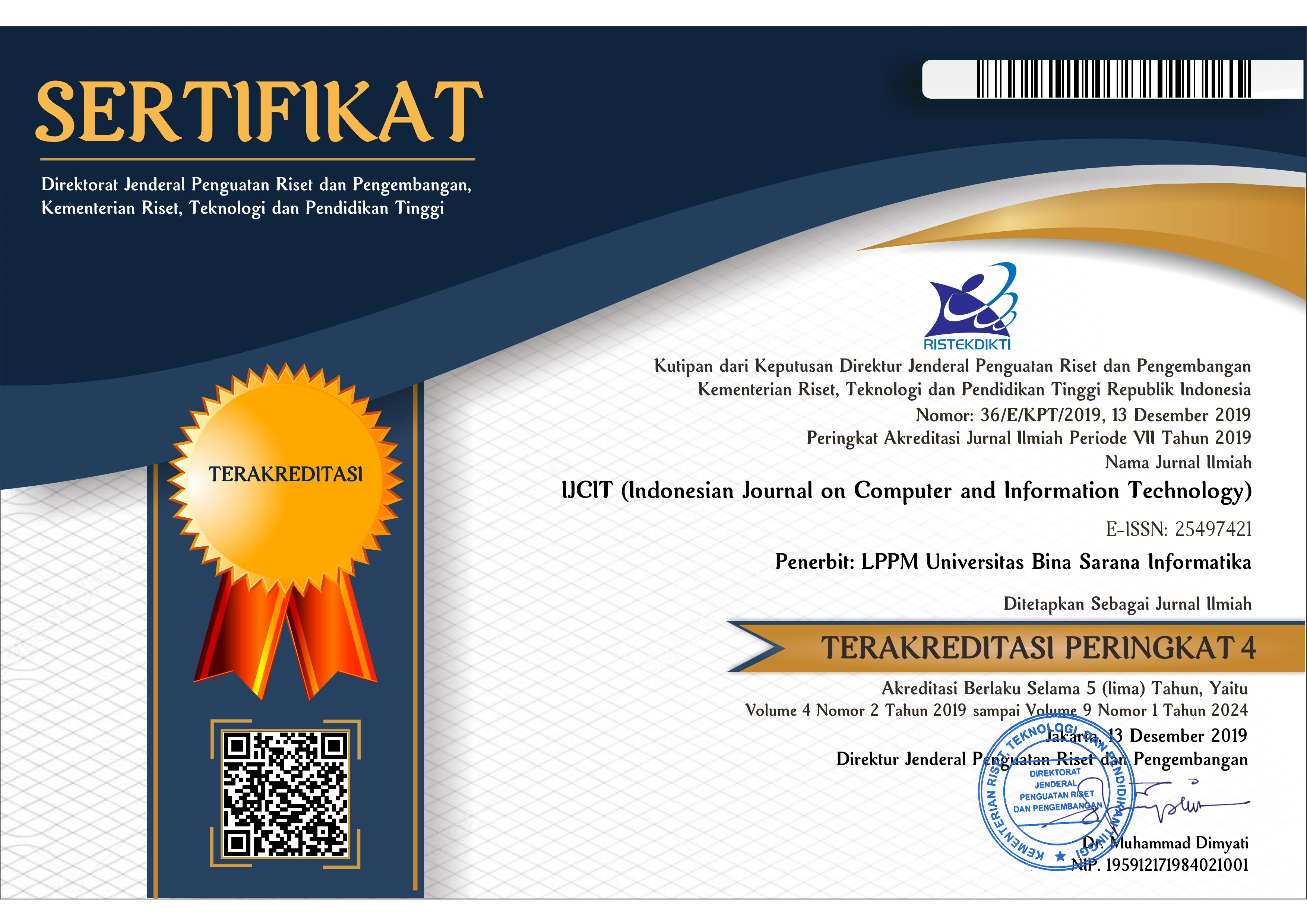Analisis Algoritma Naive Bayes Classifier untuk Klasifikasi Tweet Pelecehan Seksual dengan #MeToo
Sari
Pelecehan seksual adalah perilaku yang ditandai oleh ketika seseorang membuat komentar seksual yang tidak diinginkan dan tidak pantas atau menyentuh secara fisik di tempat kerja atau situasi profesional atau situasi sosial. Permasalahan terhadap tweets yang mengandung curhatan para korban pelecehan seksual menjadi hal penting untuk dikaji sebagai pemrosesan teks. Analisis sentimen dapat digunakan sebagai solusi untuk mengidentifikasi tweets pelecehan seksual berdasarkan jenisnya dengan metode klasifikasi menggunakan algoritma Naïve Bayes Classifier. Naïve Bayes Classifier menggunakan metode probabilitas dan statistik setiap kelas dalam pembelajaran klasifikasinya, sehingga jarak perbedaan antar kelas tidak besar. Tujuan penelitian ini yaitu untuk mengklasifikasikan data tweets berdasarkan kelas quid pro quo dan hostile work environment. Pengujian pada penelitian ini dilakukan dengan empat skenario yang berbeda menggunakan bahasa pemrograman R dan tools RStudio yang kemudian dievaluasi menggunakan confusion matrix untuk menentukan model klasifikasi terbaik. Hasil evaluasi dengan confusion matrix didapatkan bahwa model klasifikasi terbaik adalah skenario dengan pembagian data training dan data testing 80:20. Skenario ini menghasilkan nilai akurasi sebesar 88.55% dengan recall 96.50%, precision 90.78%, dan f-measure 93.55%.
Sexual harassment is behavior that is characterized by when someone makes an unwanted and inappropriate sexual comment or physical advances at work or a professional or social situation. The issue of tweets containing the experience of victims of sexual harassment becomes important to be examined as text processing. Sentiment analysis can be used as a solution to identify sexual harassment tweets by type by classification method using the Naïve Bayes Classifier algorithm. Naïve Bayes Classifier uses the probability and statistical methods of each class in its classification learning, so that the difference between classes is not large. The purpose of this study is to classify tweets data based on quid pro quo and hostile work environment classes. Testing in this study was carried out with four different scenarios using the R programming language and RStudio tools which were then evaluated using a confusion matrix to determine the best classification model. The results of the evaluation with the confusion matrix found that the best classification model is a scenario with the distribution of training data and testing data 70:30. This scenario produces an accuracy value of 88.55% with a recall 96.50%, precision 90.78%, and f-measure 93.55%.
Teks Lengkap:
PDFReferensi
Basuki, N. V. A., Mulyono, & Qomariyah, U. (2018). Jurnal Sastra Indonesia Pengaruh Pelecehan Seksual Terhadap Pembentukan Perilaku Transgender pada. Jurnal Sastra Indonesia, FBS Universitas Negeri Semarang, 7(2), 95–100.
Fitzgerald, L. F., & Gelfand, M. J. (2010). Suffering in Silence: Procedural Justice Versus Gender Socialization Issues in University Sexual Harassment Grievance Procedures. Basic and Applied Psychology, 17(August 2011), 37–41.
Hartanto. (2017). Text Mining Dan Sentimen Analisis Twitter Pada Gerakan Lgbt. Intuisi : Jurnal Psikologi Ilmiah, 9(1), 18–25.
Kumar, L., & Bhatia, P. K. (2013). Available Online at www.jgrcs.info TEXT MINING : CONCEPTS , PROCESS AND APPLICATIONS. 4(3), 36–39.
Mastering Machine Learning with R - Cory Lesmeister - Google Books. (n.d.). Retrieved February 16, 2020, from https://books.google.co.id/books?hl=en&lr=&id=nvh_CwAAQBAJ&oi=fnd&pg=PP1&dq=text+mining+leismester+2015&ots=PNL5u7biBK&sig=s4AFqar4yukycqEWBglUAnv06NQ&redir_esc=y#v=onepage&q=text mining leismester 2015&f=false
Maulina, D., Sagara, R., Komputer, I., & Utara, J. R. (2018). KLASIFIKASI ARTIKEL HOAX MENGGUNAKAN SUPPORT VECTOR MACHINE LINEAR DENGAN PEMBOBOTAN TERM FREQUENCY – INVERSE DOCUMENT. 2(1), 35–40.
More than 12M “Me Too” Facebook posts, comments, reactions in 24 hours - CBS News. (n.d.). Retrieved February 17, 2020, from https://www.cbsnews.com/news/metoo-more-than-12-million-facebook-posts-comments-reactions-24-hours/
Rustiana, D., & Rahayu, N. (2017). Analisis Sentimen Pasar Otomotif Mobil: Tweet Twitter Menggunakan Naïve Bayes. Simetris: Jurnal Teknik Mesin, Elektro Dan Ilmu Komputer, 8(1), 113–120.
Sari, F. V. (2019). Analisis Sentimen Pelanggan Toko Online Jd . Id Menggunakan Metode Naïve Bayes Classifier Berbasis Konversi Ikon Emosi. 10(2), 681–686.
Sartika, D., & Indra, D. (2017). Perbandingan Algoritma Klasifikasi Naive Bayes, Nearest Neighbour, dan Decision Tree pada Studi Kasus Pengambilan Keputusan Pemilihan Pola Pakaian. Jurnal Teknik Informatika Dan Sistem Informasi, 1(2), 151–161.
Wahyuni, R. T., Prastiyanto, D., & Supraptono, E. (2017). Penerapan Algoritma Cosine Similarity dan Pembobotan TF-IDF pada Sistem Klasifikasi Dokumen Skripsi. Jurnal Teknik Elektro, 9(1), 18–23.
What Is Quid Pro Quo Sexual Harassment vs Hostile Work Environment Sexual Harassment? (n.d.). Retrieved February 17, 2020, from https://www.sexualharassmenttraining.com/blog/detail/13/what-is-quid-pro-quo-and-hostile-work-environment-sexual-harassment
Xu, S. (2018). Bayesian Naïve Bayes classifiers to text classification. Journal of Information Science, 44(1), 48–59.
DOI: https://doi.org/10.31294/ijcit.v5i2.8636
##submission.copyrightStatement##
##submission.license.cc.by-sa4.footer##
P-ISSN: 2527-449X E-ISSN: 2549-7421
Statistik Pengunjung Jurnal IJCIT











